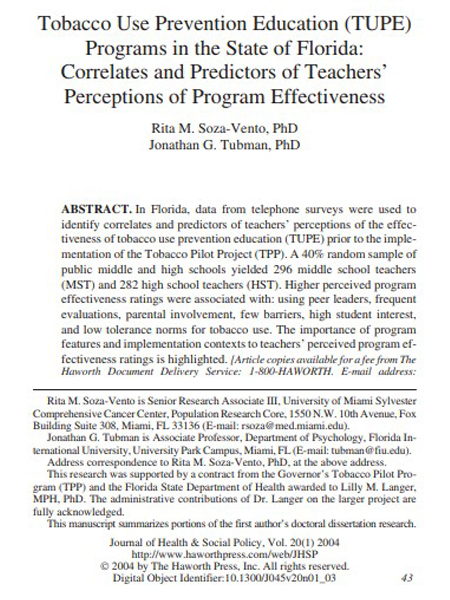Tobacco Use Prevention Education (TUPE) programs in the State of Florida: Correlates and predictors of teachers’ perceptions of program effectiveness
 Abstract: In Florida, data from telephone surveys were used to identify correlates and predictors of teachers’ perceptions of the effectiveness of tobacco use prevention education (TUPE) prior to the implementation of the Tobacco Pilot Project (TPP). A 40% random sample of public middle and high schools yielded 296 middle school teachers (MST) and 282 high school teachers (HST). Higher perceived program effectiveness ratings were associated with: using peer leaders, frequent evaluations, parental involvement, few barriers, high student interest, and low tolerance norms for tobacco use. The importance of program features and implementation contexts to teachers’ perceived program effectiveness ratings is highlighted.
Abstract: In Florida, data from telephone surveys were used to identify correlates and predictors of teachers’ perceptions of the effectiveness of tobacco use prevention education (TUPE) prior to the implementation of the Tobacco Pilot Project (TPP). A 40% random sample of public middle and high schools yielded 296 middle school teachers (MST) and 282 high school teachers (HST). Higher perceived program effectiveness ratings were associated with: using peer leaders, frequent evaluations, parental involvement, few barriers, high student interest, and low tolerance norms for tobacco use. The importance of program features and implementation contexts to teachers’ perceived program effectiveness ratings is highlighted.
Soza-Vento, R.M., & Tubman, J.G. (2004). Tobacco Use Prevention Education (TUPE) programs in the State of Florida: Correlates and predictors of teachers’ perceptions of program effectiveness. Journal of Health & Social Policy, 20(1), 43-63. doi:10.1300/J045v20n01_03
